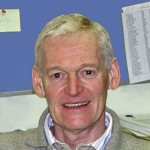Professor

Phone: 604–822–6891
Email: ifranks@mail.ubc.ca
Office Address:
D. H. Copp Building, Room 4602 2146 Health Sciences Mall, Vancouver, BC V6T 1Z3
Mailing Address:
War Memorial Gymnasium, Room 210 6081 University Boulevard, Vancouver, BC V6T 1Z1
Education
University of Alberta, 1980, PhD, (Motor Learning and Control)
University of Alberta, 1977, MSc, (Motor Learning and Control)
McGill University, 1975, BEd, (Physical Education)
St. Luke’s College, Exeter University, 1968, Certificate of Education, (Math/Physics)
Research Area
Research Interests
Research and teaching
Many of our actions are triggered by changes in the environment and most of these actions can be prepared in advance of the anticipated change. When human action is observed in these reactive situations one may be oblivious to the fine synchronization that is required between movement preparation, initiation and execution and yet each is vital to the effective control of action. Success and failure of these processes are evident in many everyday situations. From the Olympic sprinter who prepares for a fast start out of the blocks in elegant smooth pursuit of their goal, to the Parkinson’s disease patient who fails to initiate a seemingly simple step over a roadside curb and freezes despite what appears to be maximum cognitive effort. In our lab we examine how people prepare, initiate and control their actions in various environmental contexts using a variety of methodologies. One method we have used to good effect in the past is to probe the processes of movement preparation by delivering a startling stimulus along with the “go” command. This brief loud sound causes a startle reflex but also appears to trigger and release any voluntary movement that is prepared, stored and ready to initiate. Indeed very fast reaction times of the sprinter (less than 100 milliseconds) may be the result of a startle like trigger and not a false start. We have also shown that startle can trigger prepared movements quite smoothly and effortlessly in patients with Parkinson’s disease. Because we have an understanding of the pathways responsible for the startle reflex it then becomes possible to map movement preparation and initiation as it interacts with this reflex. In the future, we will to continue our research efforts into the investigation of motor preparation and initiation using techniques such as startle.
Publications
Consulting and professional practice
Consulting enquiries should be directed to me at the the email address above.